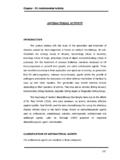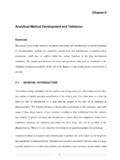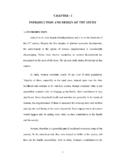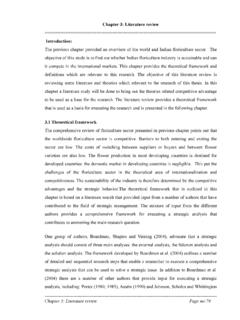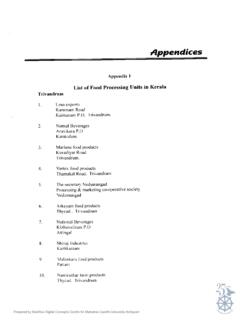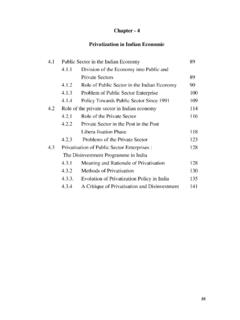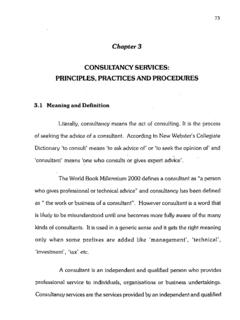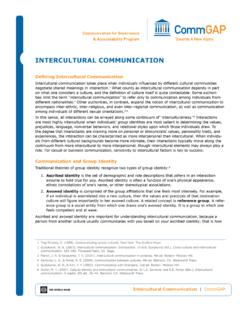Transcription of CHAPTER – V THE RELATIONSHIP BETWEEN …
1 201 CHAPTER V THE RELATIONSHIP BETWEEN international LAW AND MUNICIPAL LAW WITH BRIEF ACCOUNT OF STATE PRACTICES (OTHER THAN INDIA) IN THIS REGARD Introduction: Since the focus of the study is on Domestic Application of international Human Rights Law in India, nothing is more essential to a proper grasp of the subject than a clear understanding of the RELATIONSHIP BETWEEN international Law and Municipal Law. It clarifies the nature, scope and extent of application/enforcement of international Human Rights Law in the domain of municipal sphere. Where a State is a Party to an international Treaty (such as human rights treaty) which has entered into force, the question arises whether and how the provisions of that treaty can become part of the State s own domestic law, viz.
2 , whether and how the obligations undertaken by the State on the international plane, which in substance for the benefit of the individuals within its domestic jurisdiction, can become transformed into obligations owed directly to those individuals within its own domestic legal system. That question involves the RELATIONSHIP BETWEEN international law and domestic law, which has been the subject of a longstanding debate BETWEEN two schools of thought among academic writers, who call themselves as dualists and monists respectively. Theories as to RELATIONSHIP BETWEEN international Law and Municipal Law- Dualism & Monism: Dualists see international Law and Municipal Law as distinct and separate arising from different sources, governing different areas and relationships, and different in substance.
3 According to Dualists, international law is inferior to and weaker than, domestic law. If international law ever becomes part of domestic law, that can only be because domestic law, has chosen to incorporate it. Monists on the other hand contend that there is only one system of law, of which international and domestic laws are no more than two aspects. They justify this by claiming that both of them govern sets of individuals (States being seen for this as 202 collection of individuals) both are binding, and both are manifestations of a single concept of law. Hence international law is superior and stronger, as it represents the system s highest rules jurisdiction on a domestic level being only delegated to states, which cannot avoid being bound to apply international law at the domestic level.
4 So, if domestic law anywhere conflicts with international law that is the State s fault, and will not excuse the State s Viewed on the international plane, the dispute BETWEEN these two schools of thought is indeed academic. Formally international and domestic law as systems can never come into conflict. What may occur is something strictly different, namely a conflict of obligations or an inability for a state on the domestic plane to act in the manner required by international law . It is well settled that international law will apply to a state regardless of its domestic law and that a state can not in the international forum plead its own domestic law, or even its domestic constitution, as an excuse for breaches of its international Viewed on the domestic plane, however, the dispute is not merely an academic one, for the two schools of thought lead to very different results.
5 Whether international law forms part of domestic law is a question, which in practice, is decided either by the Constitution or a Statute or by the domestic Courts of each State. Monists say that it will always form such a part; dualists, that it will form part only if the domestic law has expressly as impliedly incorporated it. In fact, many States expressly accept international law as part of their domestic law, leaving academicians to debate whether the acceptance was necessary or superfluous. But others do 1 Sinha J., A Contexualised Look at the Application of international Law the Indian Approach , AIR Jour, 2004, M. Sivaraman, Role of Indian Judiciary in Harmonising Municipal Law with international Law , AIR, Jour.
6 , 2003, at 211-12. 2 Advisory Opinion on Exchange of Greek and Turkish Populations PCDJ, series B, No. 10, 20. Advisory opinion on the Treatment of Polish Nationals and other persons of Polish Origin or Speech in the Danzing Territory, PCIJ, series A/B, No. 44, 24; Free Zones of Upper Savoy and District of Gex case, PCIJ, Series A/B No. 46, 167. See also Alabama Claims Arbitration, Moore 1 Int. Arb. 445 at 456); and the international Draft Declaration on Rights and Duties of States 1949, (YB ICC 1949, 246:288), Article 13: Every state has a duty to carry out in good faith its obligations arising from treaties and other sources of international law, and may not invoke provisions in its own constitution or its laws as an excuse for failure to perform this duty.
7 This formulation was later commended by the to its Members in Resolution 375 (iv). 3 Paul Seighart The international Law of Human Rights , Claredon Press, Oxford, 1983, Pp. 40 41. 203 Where international law becomes incorporated in a State s domestic law without the need for specific legislation, those parts of it, which are sufficiently explicit to be enforceable by the domestic courts, are known as self executing .4 Some States provide by their Constitutions that certain provisions of international law shall be self-executing. For example, the Constitution of the , provides that international treaties are part of the law of the Other countries have gone even further by not only making international law self executing, but assigning to it a rank in the domestic hierarchy superior to all prior and subsequent legislation.
8 Examples of this are France and But there are other States that do not accept any international law as self-executing, or so accept it in part. For example United Kingdom ( ). Where international Law and Domestic Law coincide, there is of course no problem. But if they differ either because international law imposes an obligation on a State which is not reflected in its domestic law, or because obligations imposed by international law and domestic law respectively conflict with each other in a particular case a domestic court will generally have to apply the following (1) Where the domestic legal system is founded on a dualists view, and the obligation under international law has not become self-executing under a standing provision of the domestic law or been expressly re-enacted in that law, the court must follow the domestic law and ignore the international law.
9 (In where the legal system is entirely dualist and there are no provision for self-execution), U. K. courts are not entitled to take into account provision of international treaties if the legislature has not expressly enabled them as part of domestic law though is bound by treaty provision. 4 Robertson would prefer the phrase directly enforceable see Human Rights in Europe, 29 cited in Paul Seighart, Supra note 3. 5 Article VI Section 2: This constitution, and the laws of the United States which shall be made in pursuance thereof; and all treaties made, or which shall be made, under the authority of the United States shall be the supreme law of the land; and the judges in every state shall be bound thereby, any thing in the constitution or laws of any state to the contrary notwithstanding.
10 6 Article 55 Constitution of France, 1958, says, Treaties or agreements duly ratified or approved shall, upon their publication have an authority superior to that of laws, subject for each agreement or treaty, to its application by the other party. Germany Basic Law of 8 May 1949, as amended on 1st Jan. 1966, Art. 25; The general rules of international law shall be an integral part of federal law. They shall take precedence over the laws and directly create rights and duties for the inhabitants of the federal territory . 7 Paul Seighart, Supra note 3, Pp. 41 42. 204 (2) In any other case, the court must have regard both to international law and to domestic law. If there proves to be a conflict BETWEEN them, the court must follow any rules of domestic law that prescribe which of them is to (3) If there are no such rules, it will probably be because the domestic legal system is founded on the monistic view, and so international law will Unfortunately, however, existing legal theories concerning such application of international rights tend to belittle both the judicial agency and the desirability of judicial participation in implementing even relatively uncontroversial international rights at domestic levels.
